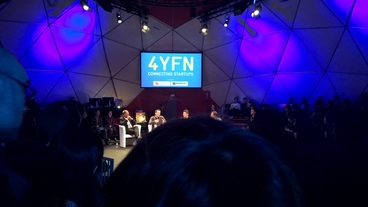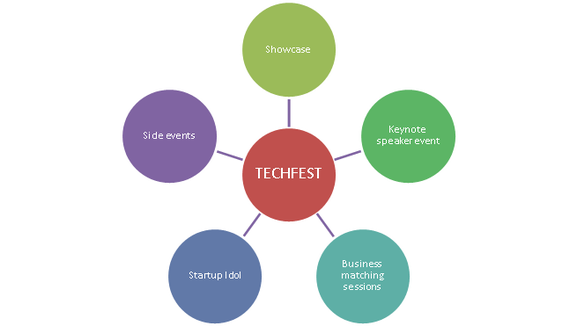In addition, the startup infrastructure works well at 3 different levels: local, national and global. There is a lot of support provided both by various grassroots movements and the government as well as good access to global network. Secondly, Canada has been ranked by the UNDP and the World Economic Forum as one of the easiest countries to start a business. To illustrate this, Lennox provides a few examples. She says that it is possible to start a business in Canada in less than 30 minutes. Also, the costs are low, especially, in the ICT sector. The bureaucracy has been simplified a lot and there are many procedures that you can deal with online. Thirdly, the Canadian government invests a lot in startup projects. There are many tax incentives for investment in startups. For instance, in British Columbia there are angel tax credits as well as many others. Moreover, Lennox provides some other reasons why entrepreneurs should think of setting up a business in Canada. In her opinion, operating a business is much easier thanks to public funds and the help of non-profit organisations. In addition, the country has excellent global connectivity: there is a mix of cultures and thus it is very easy to access international markets via local diasporas. Another reason worth attention is the fact that Canada has developed both strong volunteer culture and entrepreneurship culture. As a result, the Canadian society is civic-minded and involved in various enterprise projects. Furthermore, the country can offer talented and skilled workers. It is one of the highest-educated populations in the world. There is a well-developed education system: universities and colleges aim to prepare graduates whose skills are relevant to market needs. Finally, Lennox completes her list by focusing on the quality of life in Canada. She makes a point that thanks to a good demographic and geographic spread, the country has a lot of space to develop various entrepreneurial projects. The author of this text is Birute Birgelyte, PR and Communications Trainee at Startup Commons. You are free to re-edit and repost this in your own blog or other use under Creative Commons Attribution 3.0 License terms by giving credit with a link to www.startupcommons.org and the original post.
This is originally written by Søren Berg Rasmussen, Project Coordinator at Enterprise Services, City of Helsinki. You are free to summarize and repost this or other use under Creative Commons Attribution 3.0 License terms by giving credit with a link to www.startupcommons.org and the original writer. When I was first introduced to the Startup Commons platform, my initial feeling, like for so many others I reckon, was a lingering question of why I would need yet another social media platform. How would this be any different than LinkedIn or Facebook? And, moreover, why would I want yet another online profile that I would need to maintain, update and keep relevant? I already have so many that I need a list in order to remember which ones I have joined and what my user credentials are.
Of course I understood the difference in terms of how the Startup Commons platform was made with the purpose of serving startups in mind. But still the question lingered: “Why couldn’t this be done in one of the very many already existing platforms?” Luckily it only took me a few minutes of talking to one of our ‘gurus’ here at Enterprise Helsinki, Mika Valtasaari, before I understood the golden opportunities provided by the Startup Commons platform, the genius of the shared source and the open mind of the founders. I needed a place to develop a matching system in combination with a network environment for a mentoring programme, and the Startup Commons platform seemed like just the place. Startup Commons 101 Basically the Startup Commons platform provides the opportunity to set up a customized network in which different user types such as startups, VCs, talents, etc. can find each other. It also allows the users to move between different networks, and soon it will also be possible to share information between networks on the admin side of things. This is the part that seems very identical to what hordes of other network platforms also do. However, the keyword here is customized. Each network can be customized to provide exactly the functionalities needed to serve its own specific purpose. It can be as simple as the ability to set up events and invite participants in the network. Or it can be as complicated as a system with a number of user types being matched to each other or to the services or events in the network most relevant to them and their specific needs. Our needs: serving the whole community I needed two things when I first approached the Startup Commons platform. First and foremost I needed a matching system to make my life easier when deciding which mentee candidates were best suited for the mentors we had in our pool. The challenge was that we had hundreds and Excel only provided so much overview. The other challenge was how to coordinate different mentoring programmes, so that when one would find good mentor candidates, these would not be lost due to the limitations of the programmes but rather be shared with other programmes that might need them. The Startup Commons platform was already developing a CRM system. All I had to do was to tweak it so that network admins could share complete CRM systems and/or individual entries. Combined with the option to create tags and notes for the entries, this is now being developed to be a tool for very in-depth sharing and coordination between network CRMs and the efforts being put into searching for mentors. Take networks which are not competing but complementary, and then replace the word mentor with companies, clients, customers, etc. and you will see the value: contact markup to avoid repeat calls or to direct contacts from a network which was not relevant to them to a network providing what they need; improved contact information reliability as a result of several network admin owners’ updating the shared contacts when using them, and much more. In essence, it is a simple fix with huge potential. Matching with Startup Commons Even bigger potential lies in the matching system. The system is built on the simple idea of comparing choices selected by users in forms. The forms are created dynamically by network admins and can contain any type of questions. The matching takes place between options on single answer and multiple answer lists, where the admin presets the matches and assigns weights to each matching option. This means that anything can be matched because forms can be created for information about anything. It also means that the matching can be customized when setting weights, so that admins can determine relevance levels for individual answer options. We can therefore now set up a matching programme within a Startup Commons network where we can match mentors and mentees registering for our programme and filling in the two forms. We can also set up a matching programme for determining the necessary services needed for a growth startup to move from stage -1 to 0 by letting startups fill in a form which we then match to services potentially needed in each stage on the startup development path. We can also create a matching system for finding the right talents from, for example, a pool of long term unemployed to available jobs. Or make a matching system for finding the most suitable startups for our pool of VCs. Etc., etc. Because of the flexibility of using custom made forms, we can essentially match anything. The only limitation at this stage is the inability to match free form text inputs. But this is something we will start tackling in the near future when we also begin to develop a method for validation of form input such as user skills. The beauty of the system The Startup Commons platform provides endless opportunities for any development because we let it. Anyone who chooses to use the system can have their own customized version developed, while still maintaining the ability to connect to other networks in the platform, as long as the functions are compatible. The fact that the system is a shared source also means that whatever we create here for our specific purposes becomes available for anyone else in the system who might need it. It also allows for a continuous development to take place, where other users of the system see possibilities we did not realize. Because of the flexibility of the platform and the openness with which it is being developed, the business value for any organization choosing this path is almost endless. Choose a closed system only available to your employees and management team, and your users can still enjoy both the benefits of your own tailored system and the width of other networks available in the platform when moving freely around with their user profiles. Set up a network where by filling in a simple form your customers receive instant matches with the services you provide. And remember that while it might seem a hassle to have yet another user profile or system to manage, most of the information you have made before on LinkedIn or Facebook is easily imported when first entering the system. To my mind, the Startup Commons platform is no longer just another network like LinkedIn or Facebook (I guess it actually never was). It is more than the sum of the two with the added value of you being able to decide what you want the system to do for your business or institution. Despite the recognition of the economic and social value which technology entrepreneurs create, little attention has been paid to developing a strong startup ecosystem in Vietnam so far. Such a view is held by Dr Pham Hong Quat, Director General of the National Agency for Technology Entrepreneurship and Commercialization Development (NATEC), the Ministry of Science and Technology of Vietnam. In order to support new technological projects, the Agency has decided to organise TECHFEST 2015, an event for tech startups. It will be part of the programme of the annual Science and Technology Week. In order to provide clear information about TECHFEST, we would like to offer you a short Q&A session. Q&A: TECHFEST 2015 When and where will the event take place? Between 15–17 May at Vietnam National University. Who else supports it? The event is a collaborative project between the National Agency for Technology Entrepreneurship and Commercialization Development (NATEC), hub.IT, Tech In Asia, Hatch! Program and the Founder Institute. What are the objectives of TECHFEST? There are 2 main objectives of the event:
Who can participate? The event is open for technology and startup experts, startups, startup support agencies (incubators, accelerators), investors, potential startup clients and media companies. There are also invited some representatives from the governmental institutions, students and other people interested in technologies and startups. What kind of activities will be there? TECHFEST offers the following activities: More detailed information on the event agenda can be found here. Why is it worth participating in TECHFEST? On the official event website, there is an informative Q&A session on the benefits of participation in the event for different groups. We would like to outline the most important points. The biggest participation benefits for startups, according to the organisers, are the following:
The organisers promise startup support agencies that out of participation in TECHFEST they would get:
Finally, investors could also benefit from given opportunities:
More information on TECHFEST 2015 can be found on the official event website. The author of this text is Birute Birgelyte, PR and Communications Trainee at Startup Commons. You are free to re-edit and repost this in your own blog or other use under Creative Commons Attribution 3.0 License terms by giving credit with a link to www.startupcommons.org and the original post.  Have you ever wondered how cold weather can affect your business? Jan Ameri, Event Director at ArcticStartup, claims that “the North is an investor no-go area” in wintertime. He came up with such an idea after feedback he received from Garan Goodman, Director of Wayra Munich, during the last Arctic15 startup event in Helsinki, Finland. Mr Goodman praised networking possibilities and the event atmosphere. The only thing he complained about was the weather: “You […] should just pack these startups on a plane and fly them to someplace nice and warm. I would be happy to come to see these companies there.” His suggestion was a stimulus to organise Arctic Startups in the Sun. Murcia Edition, the southernmost Nordic startup event so far. About the event Arctic Startups in the Sun. Murcia Edition is a collaborative project between ArcticStartup, a Helsinki-based startup media company in the Nordic and Baltic region, and the Institute of Development of the Region of Murcia (INFO), Spain. It will take place between 25–28 March in Murcia and Cartagena. It aims to collect 50 Nordic / Baltic companies and 50 Spanish companies and invite over 20 international investors in order to offer them comfortable networking conditions, promote internationalisation and direct private investment as well as to help to develop innovative business in the Region of Murcia. The main partners of the event are: Finpro, Team Finland, Telefónica, La Verdad, the Barrabés Group and the Vocento Group. Programme The event programme includes a variety of activities: workshops, coaching sessions, presentations, B2B events and networking events. There will be also appointed some exhibition space to present company projects and establish contacts with potential investors and partners. The programme will cover the following topics: B2B & B2C Software and Services like Media, Web, Mobile, Gaming and Ecommerce, Plus Sports, Health and Wellbeing, Cleantech and Energy, Education, Logistics, Food Technology and Tourism. For more information, please see the official event programme. Participants Both early-stage and late-stage companies are welcomed to participate. The organisers may also consider accepting some other companies involved in the above-mentioned areas to the event. There are invited representatives of various organisations to give speeches: Andrés Vicente Gómez, LolaFilms, Carlos Barrabés, Barrabés Group, Roberto Tanzi-Albi, Ambassador of Finland in Spain and Hugo de los Santos, Telefónica, to mention a few names. To see the complete list of the speakers, please visit the official event website. Why to participate in Arctic Startups in the Sun. Murcia Edition? The event offers an excellent communication platform for Nordic and Spanish entrepreneurs and international investors involved in technological projects. It is an important step to establishing valuable business connections which could end up in international partnerships or good investment deals. Sharing experience and knowledge, getting some guidance and critical insights on entrepreneurship can help you to turn your own startup project into another international startup success story. It is also worth mentioning the economic and social value of Arctic Startups in the Sun. Murcia Edition. It could provide a solid foundation for innovative business in the Region of Murcia. The economic development would have a significant impact on social welfare: more business activities in Murcia would eventually mean higher living standards of the residents. From the Nordic perspective, the event could be considered as a bridge both to the Spanish market and the Latin American market. Not only would the Nordic and Latin American countries benefit economically from closer cooperation, but again – like in the case of Murcia – all local communities would. As a result, the event could contribute a lot to developing a solid global startup ecosystem, in which economic growth would go side by side with social welfare. The registration form can be found here. The author of this text is Birute Birgelyte, PR and Communications Trainee at Startup Commons. You are free to re-edit and repost this in your own blog or other use under Creative Commons Attribution 3.0 License terms by giving credit with a link to www.startupcommons.org and the original post.
ArcticStartup, a startup media company in the Nordic and Baltic region, has decided to start a new project: CoFounder, a print magazine about the European startup industry. The project is a result of cooperation between Dmitri Sarle, CEO of ArcticStartup, Greg Anderson, Editor-In-Chief of ArcticStartup, and Tarmo Virki, a former Reuters journalist and Head of Forbes Estonia. The second issue will be published soon. Why print? This seems to be a natural question to ask at the time when there is so much emphasis on becoming more digitally present, interactive and socially-minded. You need to present good reasons why there is a point in getting back to a traditional media format and going against eco fashion, i.e. how you would justify sacrificing some trees for print. In their Indiegogo campaign, CoFounder’s members try to explain their reasons. Tarmo Virki claims that although “the European startup scene is booming”, there is no real journalism to cover it. The startup media landscape lacks coordination and “is fragmented into small regional blogs” and US-centric media. There is no European-oriented media and alternative to the American perspective, which dominates the international startup news agenda. Virki reveals that his team “wanted to create something that would serve the European startup industry”. The print format was also chosen because it gives solid information that readers could rely on and keep for future reference. In addition, it gives professional fulfilment for journalists: it is a physical reflection of their hard work. “We love facts not hype” There are three main CoFounder’s objectives. Dmitri Sarle says that the team wants to help European startups by (1) giving them new business ideas, for example, by asking investors what kind of companies they are looking for, and by (2) providing tools to grow startup business. A lot of attention will be paid to successful and failure startup stories to guide others. The last CoFounder’s objective is (3) to offer company analysis and deep insights into successful startups. The co-founders make a strong statement: “Writing for the web means selling you, the user, as a product while we’d rather sell an amazing product to you.” Greg Anderson explains that they want to create a ‘publication for the readers’, in which they could find valuable information not what is popular on social media. Tarmo Virki supports him claiming that “most media are a click-based advertising platform”, so CoFounder could become a good alternative with its simple slogan: “We love facts not hype.” Support for CoFounder On 12 March there was launched a campaign on Indiegogo to raise funds for the CoFounder project. At the moment, the team members are ready to publish their second issue and are raising funds for others. CoFounder is an open project: all startups are welcomed to actively participate in the creation process. “We are not doing this for ourselves, we want our community to be a part of the magazine,” the co-founders claim. The ultimate goal of the project would be establishing a media startup which would serve the interests of the entire community. In order to achieve it, you could support CoFounder in several ways:
In appreciation of your support, CoFounder’s team gives you some offers. For more information, please visit the Indiegogo campaign website. The author of this text is Birute Birgelyte, PR and Communications Trainee at Startup Commons. You are free to re-edit and repost this in your own blog or other use under Creative Commons Attribution 3.0 License terms by giving credit with a link to www.startupcommons.org and the original post. Photo credit: CoFounder.
 Mobile World Congress, MWC, took place again in Barcelona on the first week of March. It is an annual event where basically all relevant mobile and connectivity people come to see the latest trends, products and meet each other. MWC is the most important mobile event, over 90,000 visitors in this year. Does MWC make sense for your startup? We have seen a significant disruption in mobile business in the last 7 years. There are a lot of mobile businesses, like all app business, that bypass carriers. And many startups are related to that business. Apple and Android changed the mobile business. In the last year MWC introduced a new concept: 4YFN, 4 Years From Now. It is a kind of dedicated startup event during MWC. In 4YFN startups can have a stand for a lower price, tickets are cheaper and there are startup specific program, like a lot of pitching and investor dating. And there were many kinds of startups, but quite many of them were somehow linked to mobile apps, like apps for car parking, collecting customer data, gaming and advertising. Several countries had also their areas to promote their own startups at 4YFN. Many countries have also their own departments at the main MWC event. It is typically possible for SME’s and startups to get space in those national departments with much smaller investment than alone. Many of those SME’s and startups offer e.g. technology to carriers or larger infrastructure vendors. MWC is especially mobile and connectivity technology, infrastructure and support IT solutions event. It is a b2b event to make deals and find partners. It is not a consumer show, it is not a general mobile apps show and it is not really a place for b2b business where carriers or infrastructure have no role. MWC is not relevant for all mobile startups. For example, if you offer your application to consumers, or you have b2b solutions that are for retailers or publishers, MWC is probably not so relevant for you. But you make solutions for carriers, infrastructure components (e.g. payments or security), or look for partners from telcos, network or device business, MWC is very relevant for you. MWC is not a general startup event (but there are so many of them), but for specific industries and solutions it is the most relevant event in the world. What was hot in this year? Mobile handset offered nothing very unique, of course, many new models. Smart watches, wristbands and wellbeing products are really coming. Also mobile payment is getting a bigger role: Samsung announced Samsung Pay (a kind of Apple Pay style concept) and MasterCard had its Financial Inclusion program. Internet of Things, IoT, had very big role in this year. And it is easy to say that all kind of devices will be connected to the Internet in the future. But now IoT is still a kind hype word for many companies, and it is used in the marketing, although there are no tangible products and concept. Big data has still little bit the same problem. Many companies use it as a marketing buzzword. But with data and analytics it is very important to have tangible products, use case and real value to end-users. MWC is important event for mobile and connectivity business. And it is relevant for startups that are working in that area. It will be again in the next year late February in Barcelona. Startup should especially look at the 4YFM event and local export organizations that can offer cost-effective solutions to participate. This is originally written by Jouko Ahvenainen, co-founder at Grow VC Group. You are free to re-edit and repost this in your own blog or other use under Creative Commons Attribution 3.0 License terms, by giving credit with a link to www.startupcommons.org and the original post.
|
Supporting startup ecosystem development, from entrepreneurship education, to consulting to digital infrastructure for connecting, measuring and international benchmarking.
Subscribe for updates
Startup ecosystem development updates with news, tips and case studies from cities around the world. Join Us?Are you interested to join our global venture to help develop startup ecosystems around the world?
Learn more... Archives
December 2023
Categories
All
|
- Startup Commons
- Business Creators
-
Support Providers
- About Support Providers
- Learn About Startup Ecosystem
- Startup Development Phases
- Providing Support Functions
- Innovation Entrepreneurship Education
- Innovation Entrepreneurship Curriculum
- Growth Academy eLearning Platform
- Certified Trainers
- Become Growth Academy Provider In Your Ecosystem
- Growth Academy Training On-Site By Startup Commons
-
Ecosystem Development
- About Ecosystem Developers
- What Is Startup Ecosystem
- Ecosystem Development
- Ecosystem Development Academy eLearning Platform
- Subscribe to Support Membership
- Ecosystem Operators
- Development Funding
- For Development Financiers
- Startup Ecosystem Maturity
- Case Studies
- Submit Marketplace App Challenge
- Become Ecosystem Operator
- Digital Transformation
- Contact Us
- Startup Commons
- Business Creators
-
Support Providers
- About Support Providers
- Learn About Startup Ecosystem
- Startup Development Phases
- Providing Support Functions
- Innovation Entrepreneurship Education
- Innovation Entrepreneurship Curriculum
- Growth Academy eLearning Platform
- Certified Trainers
- Become Growth Academy Provider In Your Ecosystem
- Growth Academy Training On-Site By Startup Commons
-
Ecosystem Development
- About Ecosystem Developers
- What Is Startup Ecosystem
- Ecosystem Development
- Ecosystem Development Academy eLearning Platform
- Subscribe to Support Membership
- Ecosystem Operators
- Development Funding
- For Development Financiers
- Startup Ecosystem Maturity
- Case Studies
- Submit Marketplace App Challenge
- Become Ecosystem Operator
- Digital Transformation
- Contact Us








 RSS Feed
RSS Feed

